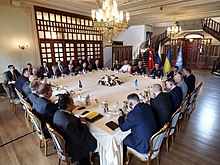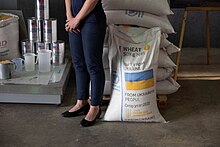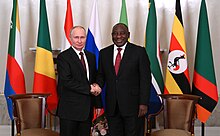Black Sea Grain Initiative
The invasion in February 2022 led to a complete halt of maritime grain shipments from Ukraine, previously a major exporter via the Black Sea.
[2] To address the issue, discussions began in April, hosted by Turkey (which controls the maritime routes from the Black Sea) and supported by the UN.
The July agreement created procedures to safely export grain from certain ports to attempt to address a worldwide food crisis.
Russia suspended its participation in the agreement for several days due to a drone attack on Russian naval ships elsewhere in the Black Sea, but rejoined following mediation.
[7] By mid-July 2023, more than 1000 voyages had successfully left Ukrainian ports carrying nearly 33 million tonnes of grain and other food products to 45 countries.
[11] In 2022, an estimated 47 million people were suffering from severe hunger as a result of the world's soaring food costs partly due to the impact of the 2022 Russian invasion of Ukraine.
Developing and emerging countries in Africa, Asia, and Latin America were impacted the most by the conflict due to their reliance on imported grain and fuel.
[12] According to the UN Food and Agriculture Organization, Ukraine is a leading grain exporters, providing more than 45 million tonnes annually to the global market.
[15] Initially, the Ukrainian government was reluctant to de-mine the sea due to the scale of the task and the possibility of leaving the ports open to attack.
[60] On 23 July 2022, less than a day after signing a grain export deal, it was reported that Russia launched Kalibr missiles at the Odesa sea trade port.
[61] The next day, Igor Konashenkov, a spokesman of the Russian Ministry of Defence, confirmed the strike, claiming that it destroyed a Ukrainian warship and a warehouse of Harpoon anti-ship missiles.
[69] By mid-July 2023, more than 1100 voyages had successfully left Ukrainian ports carrying nearly 33 million tonnes of grain and other food products to more than 40 different countries.
[75] Russian Defence Ministry spokesperson Igor Konashenkov said at a briefing, "the move was a symbolic step to disprove statements by Ukraine and its allies that Moscow is economically blockading its pro-Western neighbor".
[88][89] Canadian Prime Minister Justin Trudeau stated that the G7 is "working closely with partners like Turkey and others" to get the grain out of Ukraine, while having no confidence in Russia's reliability.
[93] Guy Platten, the Secretary-General of the International Chamber of Shipping, called the agreement a "long-needed breakthrough for the millions of people who rely on the safe passage of grain to survive".
He also noted that the opening of the grain corridor through the Black Sea showed that a diplomatic solution is possible in the Russian invasion of Ukraine.
The UN will continue their efforts to facilitate the unimpeded access to global markets for food products and fertilizers, from both Ukraine and the Russian Federation.
[102][103] Russia also gave notice that any ships entering Ukrainian waters could be considered legitimate targets of war, irrespective of the flags that they flew.
[110][111] Pope Francis appealed to Russia to restore the initiative, saying, "This is a grave offence to God because grain is His gift to feed humanity.
"[112] On July 21, 2023, Turkish president Erdogan reiterated that he wants to convince his Russian counterpart Putin to renegotiate the shipment of grain products through the humanitarian corridor via the Black Sea.
[114] On 22 July, Erdogan confirmed further discussions with Zelensky in a personal meeting in Istanbul to renew the initiative despite heavy Russian bombardment of Odesa.
China, a key ally of Russia and a main importer of Ukrainian wheat, stated that a rapid return to the agreement was essential to ensure global food security.
Erdogan expressed hope for a renewal of the grain deal and said "we, as Turkey, will reach a solution that will meet the expectations in a short time".
Russia was also close to a deal to supply Burkina Faso, Zimbabwe, Mali, Somalia, the Central African Republic and Eritrea with up to 50,000 tonnes of grain.
A few days earlier, UN Secretary-General António Guterres communicated with Russian Foreign Minister Sergei Lavrov to implement "a set of concrete proposals" in order to revive the deal.




